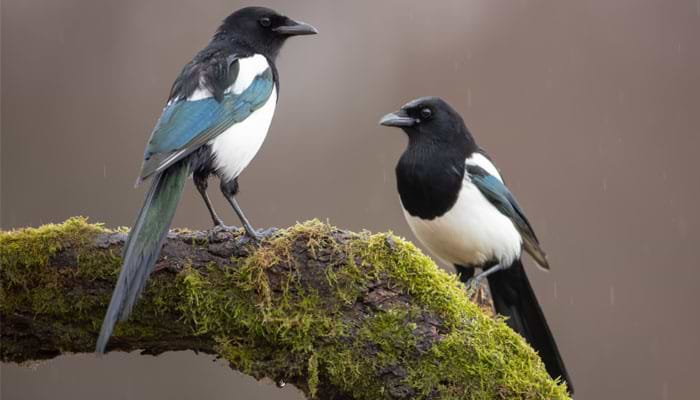
© WildMedia / Adobe Stock
The magpie is a wild bird steeped in folklore and superstition. In fact, out of all the birds found in Britain, the magpie is the one that features in most superstitious tales. Encountering one of the distinctive black and white birds can herald bad luck - and legend has it that various steps must be taken to fend off the evil spirits. Yet no-one knows why magpies are associated with bad tidings in some cultures, while in others they are deemed to be a sacred bird, which brings happiness. Magpie overview Magpies are members of the Corvidae or crow family, with the black and white Eurasian magpie believed to be one of the most intelligent species in the world. In fact, it's one of the few non-mammal species which can recognise itself in a mirror. The magpie may appear to be a plain black and white colour, but closer examination, especially in bright sunlight, reveals its black feathers have a purple-blue, iridescent hue on the wings and a green sheen on the tail. Around 46cm long, it has a wingspan of up to 60cm. Described as a "jack of all trades", they are predators (having an omnivorous diet), scavengers and pest-destroyers. Non-breeding magpies gather in flocks and exist in around 600,000 territories across the world. Once they reach maturity, they will mate for life. This occurs between one and two years old. In the UK, they are found in England, Northern Ireland and Wales, with populations in the lower regions of Scotland, but not usually in the Scottish Highlands. They inhabit a variety of environments, from upland moors to lowland farmland, and can be seen in both urban and suburban areas. Magpies are about all year round and don't migrate in winter. Popular superstitions The most well-known superstition in the UK is that seeing a single magpie is supposed to signal bad luck. A way of combating the bad tidings is to say, "Good morning, Mr Magpie - how's your lady wife today?" This means you're showing the magpie due respect, hoping that he won't pass bad luck on to you. Also, by referring to his wife, you're implying there may be two magpies around, which is good luck, according to popular belief. A famous nursery rhyme, called One For Sorrow, relates to magpies. It was first recorded in around 1777, in John Brand's book, Observations on Popular Antiquities in Lincolnshire. He quoted the following verse, relating to the number of magpies to be seen: "One for sorrow, two for mirth, three for a funeral and four for birth." The lyrics have evolved and the modern version of the nursery rhyme is: "One for sorrow, two for joy, three for a girl, four for a boy, five for silver, six for gold, seven for a secret never to be told, eight for a wish, nine for a kiss, ten for a bird you must not miss." Magpie TV show The nursery rhyme was made into the theme song for a children's television programme, Magpie, which was broadcast on ITV from 30th July 1968 until 6th June 1980. The TV show's title song was the old nursery rhyme, set to music. Played by the respected British beat and R&B band, the Spencer Davis Group, using the alias The Murgatroyd Band, the music was composed by lead vocalist and keyboard player Eddie Hardin, vocalist and guitarist Ray Fenwick and guitarist, singer and harmonica player Spencer Davis. Each episode was 25 minutes long and the first presenters were Tony Bastable, Susan Stranks and former BBC Radio 1 DJ Pete Brady. The show issued appeals for various charities and worthy causes. Unlike its BBC rival, Blue Peter, Magpie was unscripted. Other magpie folklore Aside from the famous One For Sorrow nursery rhyme, magpies have all kinds of meanings in other cultures. Magpies were said to be the only birds that didn't comfort Jesus or sing when he was crucified, leading to the superstition that they meant no good. To fend off the bad fortune, you should doff your cap to the magpie, spit three times over your shoulder (as long as nobody is walking along behind you) or flap your arms to imitate a second magpie! In some parts of the world, magpies have other meanings. For example, if you see a single magpie in Korea, it means visitors will be coming to see you. In China, seeing a magpie signifies you will have good luck and happiness, while in some regions, it's considered a sacred bird. Magpies are notoriously attracted to shiny objects, having a reputation for stealing jewellery. Italian composer Gioachino Rossini wrote an opera entitled La Gazza Ladra (which translates to The Thieving Magpie) about a girl accused of theft. She is tried, found guilty and executed, but afterwards, the true thief is found to be a magpie. All of the townsfolk are filled with remorse and they organise an annual Mass Of The Magpies to pray for the young girl's soul. For all your outdoor pursuits, MA Grigg’s Country Store has a high-quality range of clothing. Whatever the weather, we can kit you out from head to toe in brands such as Barbour, Joules and many more!




